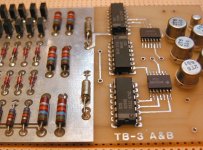Majority of diyAudio members seems to be from the 2%-world. Who know...?
Hey, A lot of people on the forum know about good design, as I stated. What percentage of them truly fall into this category? Not much. The people here know design for which I have great respect for. With sound or great sound, opinions are as many as the people in this forum......
Best of luck with your soldering to all..... Sometimes it's a pain for even a seasoned veteran!
Chris
Hey, A lot of people on the forum know about good design, as I stated. What percentage of them truly fall into this category? Not much. The people here know design for which I have great respect for. With sound or great sound, opinions are as many as the people in this forum......
Best of luck with your soldering to all..... Sometimes it's a pain for even a seasoned veteran!

Chris
Practice practice practice...Soldering is a learned art. You will find it's better to take your time. Let the iron do the work. Rule 1, the solder is your heat bridge, let it work for you. You will learn this quick when a dry iron won't solder squat. Clean your iron ( I prefer a good wire mesh pad versus a wet sponge that will lower your tip temperature just when you're ready to solder) "Tin" your iron tip and use a good quality solder. I use Kester "44" rosin core solder (63/37). It helps to also tin (presolder) you parts; wire, leads... and remember " the bigger the blob, the better the job" is NOT TRUE. I remember going through NASA certification and you want to talk about "anal". This is to much, that's not enought, that's just right, and even with a microscope. Wait till you get to hot air then the fun really starts. Bottom line, take your time and it will save you headaches down the road. Now have fun, after all this is a hobby. 🙂
Good post.... I will agree and disagree with you at the same time. Mostly, "the bigger the blob...." Try repairing pro audio, especially guitar amps and keyboards. The jacks and filter caps need big blobs!!!😉 Most of the POTs as well!!!!
So, ya done any BGA rework? Now that's fun. I like working under a microscope too but those jobs dried up a couple years ago.
OH WELL!
Chris
So, ya done any BGA rework? Now that's fun. I like working under a microscope too but those jobs dried up a couple years ago.

OH WELL!
Chris
Less Is More.....
Granted large components like sockets etc require more solder for the mechanical properties, but Frank has commented in the past that minimal solder is sonically better than excessive solder.
Eric.
Granted large components like sockets etc require more solder for the mechanical properties, but Frank has commented in the past that minimal solder is sonically better than excessive solder.
Eric.
The best solder to use is the one you find easiest to work with because that's the one that will give the best joints. A while back I was concerned about some delicate ICs that I tried a Kester specialty solder #58/245 that has a very low melt point. I've gotten in the habbit of using it for general use because it is so quick for both soldering and de-soldering that it compensates for fading near vision and shaky hands. (Us old geezers have to put up with a lot!)
Soldering is a process of alloying the solder into the surfaces of the parts being co-joined.
This process takes time and is critical to long term reliability.
Imo, quick lower temp soldering doesn't do the job quite right.
Eric.
This process takes time and is critical to long term reliability.
Imo, quick lower temp soldering doesn't do the job quite right.
Eric.
Here's the NASA-STD-8739.3 standard for soldering, as of 1997 anyway.
http://nepp.nasa.gov/DocUploads/06AA01BA-FC7E-4094-AE829CE371A7B05D/NASA-STD-8739.3.pdf
I'll just keep practicing on my small robots 🙂 I think the AKSA will be easier than the robot kits in a lot of ways, those pads on the AKSA PCB are huge compared to those little pads of the kits I've been working on.
http://nepp.nasa.gov/DocUploads/06AA01BA-FC7E-4094-AE829CE371A7B05D/NASA-STD-8739.3.pdf
I'll just keep practicing on my small robots 🙂 I think the AKSA will be easier than the robot kits in a lot of ways, those pads on the AKSA PCB are huge compared to those little pads of the kits I've been working on.
IF you are new to soldering, just get SN62 or SN63 from a quality manufacturer. Don't waste your time, at this point, with anything else. Trust me, I built my first Heathkit in 1959. Some kits that I built, even then, still work, but they look pretty bad, inside. SN62-63 will keep you from cold joints and both are low temperature solders. Flux quality(inside the solder) is important! Don't cheap out with RS. Get a name brand.
Yes, Solders Are Different.
As far as I know, RS components sell Multicore which is good, and what Radio Shach sells could be anything.
In the past I have fixed old Chinese made gear, and the solder was very poor and sounded even worse - made from recycled car batteries perhaps ?.
Eric.
RS Components or Radio Shack ?.Don't cheap out with RS.
As far as I know, RS components sell Multicore which is good, and what Radio Shach sells could be anything.
In the past I have fixed old Chinese made gear, and the solder was very poor and sounded even worse - made from recycled car batteries perhaps ?.
Eric.
- Status
- Not open for further replies.
- Home
- Amplifiers
- Solid State
- Does solder quality have an adverse effect on sound?
